Search engine optimization (SEO) is one of the most important strategies in digital marketing. It allows you to improve online visibility, increase traffic and attract new customers. For this reason, it is key to boosting the growth of brands, companies and organizations. Thus, there are a large number of SEO tools to monitor and strengthen a website’s positioning strategy. These provide metrics and KPIs on site performance, keyword rankings in search results, competitors, and much more valuable data.
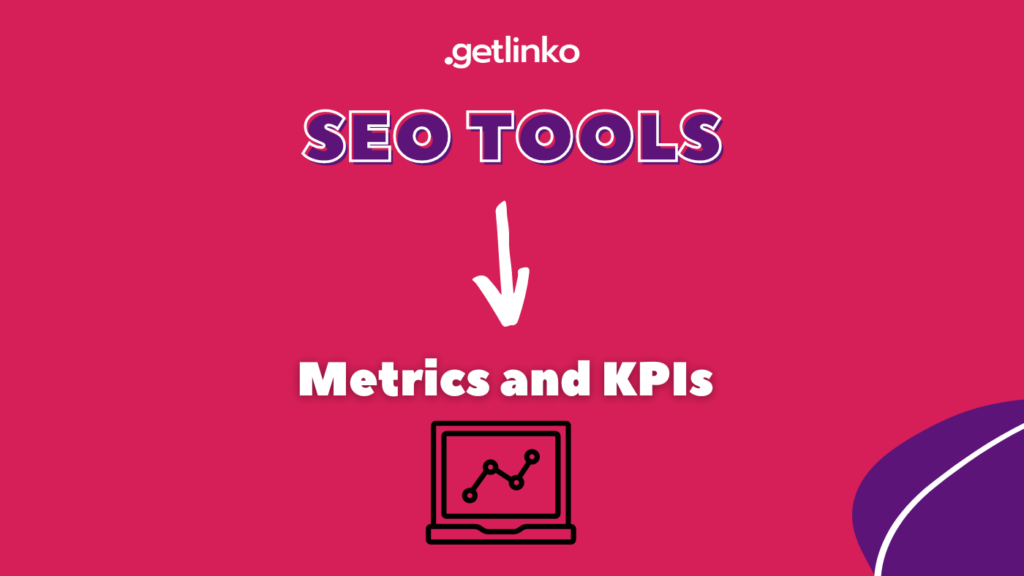
In this sense, it is essential to know which tools to improve SEO are within our reach, as well as their features, advantages and functionalities. In this way, it will be possible to determine how to use them and adapt them to our strategy. Therefore, in this article, we will talk about what SEO tools are and what they are for. In addition, we will provide a list of 20 SEO positioning tools (paid and free) divided into the following categories:
- SEO Tool Suites
- Keyword research tools
- On-page SEO tools
- Link Building Tools
- Technical SEO Tools
- Positioning Tracking Tools
- Analytical tools
- Local SEO Tools
Contenido del Artículo
- SEO Tools: What Are They?
- SEO Tool Suites
- 1. SEMrush
- 2. Mangools
- 3. MOZ
- MOZ was born in 2004 as a software development company to improve SEO positioning. Since then, it has not stopped evolving, and today, it is one of the most complete and powerful suites on the market. Additionally, it is a world reference for backlink management, thanks to its own Domain Authority (DA) and Page Authority (PA) metrics.
- 4. Ahrefs
- Keyword research tools
- On-page SEO tools
- SEO Tools: Link Building
- Technical SEO Tools
- SEO Tracking Tools
- Analytics tools
- Local SEO Tools
- Final Words
- Get quality Backlinks. Explore our media cataloge for free.
SEO Tools: What Are They?
To begin with, let’s clarify what an SEO tool is. It is a website, platform, application or software that analyzes a website in depth and provides relevant information. Such information includes key data on:
- Speed & Performance
- Quantity and quality of internal and external links
- Authority and relevance
- Keywords and search intent of users
- Indexing Status
- Contents
Consequently, SEO tools function as trackers of information related to the internal and external components of a website.
What are SEO tools for?
The data provided by SEO tools is indispensable when creating an effective SEO strategy. Therefore, they serve to determine the weak points of a site and identify opportunities for improvement. This is in order to optimize visibility and performance in the SERPs (search results). They are also the vehicle to implement actions in favor of the health of the website, the user experience, and the gain of recognition in the market.
Here are 20 SEO tools with which you can get relevant data from your website and improve your organic positioning strategy.
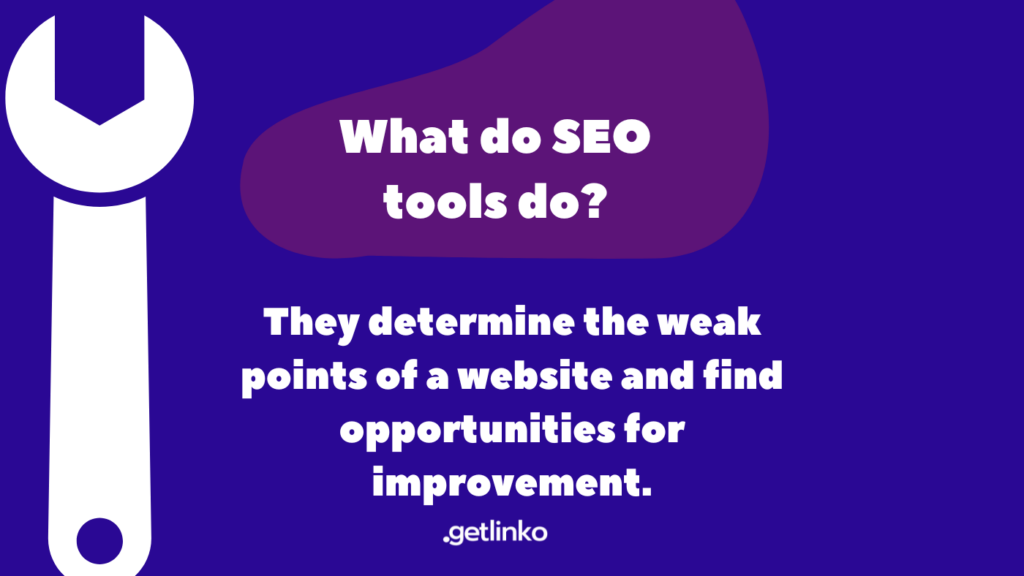
SEO Tool Suites
Suites are all-in-one tools that offer a complete assessment of a website’s health. Therefore, they generate clear reports on keyword research, technical factors, backlinks, performance in the SERPs, level of competition, etc.
In this sense, they are tools for an SEO audit, as they have the necessary functions to execute an exhaustive and professional analysis of a website. Let’s take a look at some of the most important SEO suites on the market:
1. SEMrush
Let’s start with SEMrush, one of the most widely used tools for SEO optimization in keyword research and competitor analysis. It allows you to visualize the most relevant keywords for a website, the positions of competitors, and their paid advertising campaigns. SEMrush has the option to create projects and analyze different domains and websites.
In addition, it has a specific section to carry out complete SEO audits. In this section, it is possible to examine factors such as URLs, metadata, content, backlinks, security, redirects, among others. Thus, it identifies the most serious errors on the website, generates warnings, and suggests improvement actions.
SEMrush offers paid plans starting at $119 and $229 per month for freelancers and SMBs, up to $449 per month plans for agencies, e-commerce, and large enterprises. Additionally, it has a free version with a limit of 10 searches and report requests per day.
2. Mangools
This suite is a suite of integrated SEO tools for keyword research, competitor analysis, backlink management, and SERP tracking. It has a user-friendly, flexible, and intuitive interface. In addition, it offers personalized technical support for its users. Mangools consists of 5 applications to execute SEO actions:
- KWFinder: Keyword research tool. Indicate keywords with low SEO difficulty and high search volume.
- SERPChecker: This is a tool that analyzes the performance of a certain keyword in the SERPs. It allows you to visualize which keywords have the best ranking and their level of competition.
- SERPWatcher: Used to track a website’s positions in search results. It also provides reports on changes in Google’s index based on keywords of interest.
- Link Miner: It is a link research and monitoring tool with which it is possible to extract the backlinks of the competition. Link Miner evaluates links based on metrics such as Citation Flow, Trust Flow, and others.
- SiteProflier: It allows you to verify the authority and trustworthiness of any domain or URL through MOZ and Majestic metrics.
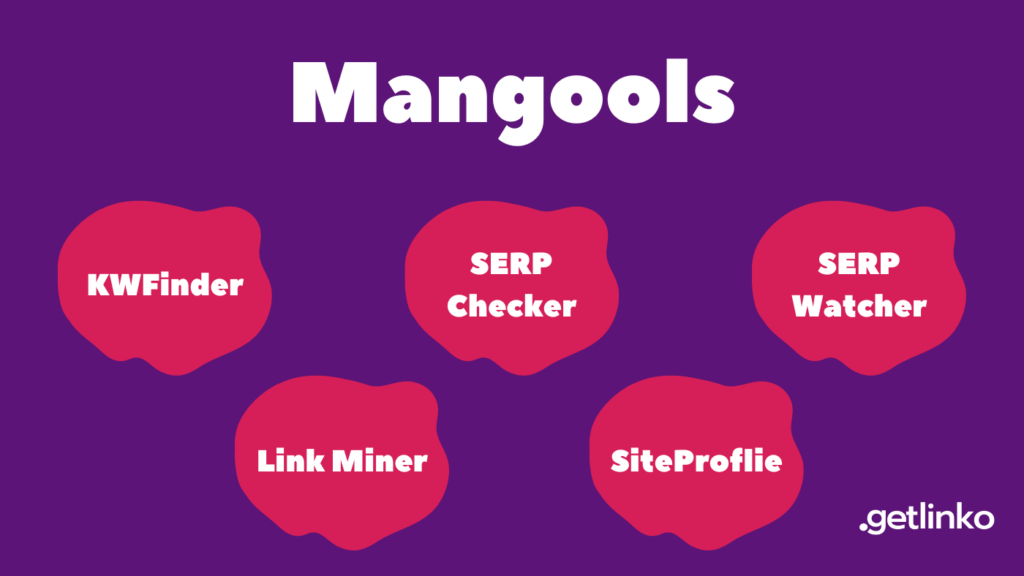
Mangools offers a 10-day free trial to access the platform and review all its functionalities. It also has a basic plan of 29.90 USD per month, a premium plan of 39.90 USD per month, and an
agency plan of 79.90 per month.
3. MOZ
MOZ was born in 2004 as a software development company to improve SEO positioning. Since then, it has not stopped evolving, and today, it is one of the most complete and powerful suites on the market. Additionally, it is a world reference for backlink management, thanks to its own Domain Authority (DA) and Page Authority (PA) metrics.
The suite features SEO audit tools, ranking tracking, backlink analysis, indexing, keyword research, internal optimization, and custom reports. All are included in its MOZ Pro version, which costs from 99 USD to 599 USD per month. In addition, the company has developed MOZ Local, a product to maximize visibility and reputation in local results.
MOZ tools also have their free version with a limit of up to 10 queries per month. Similarly, it has its own extension for Google Chrome: MozBar, which provides instant metrics about a website or search result.
4. Ahrefs
This all-in-one suite is one of the most robust on the market due to its multiple functionalities for analyzing websites. In addition to its free learning materials and online support community, the platform is characterized by its intuitive and accessible interface in easy-to-understand modules and graphics. This makes it the ideal tool for SEO professionals, beginners, content marketing experts, agencies, or bloggers.
Ahrefs offers plans ranging from $99 to $999 per month. You also have the option to purchase a 7-day trial worth $7. All plans include the main tools of the platform which are:
- Site Explorer: To analyze the organic traffic and link profile of any website or URL.
- Keywords Explorer: It is used to study keywords, analyze their SEO difficulty, and calculate their traffic potential.
- Content Explorer: To discover and analyze the most popular and top-performing content in a given niche.
- Rank Tracker: Ideal for monitoring a website’s positions and comparing its performance with competitors.
- Site Audit: To thoroughly review a website and identify if it has issues with performance, HTML tags, content, links, among other factors.
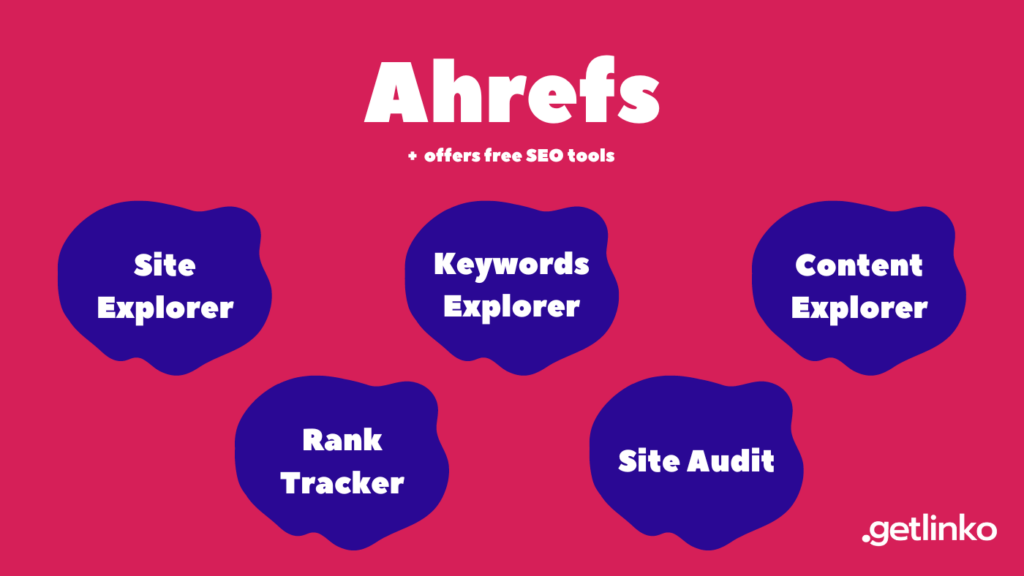
In addition, Ahrefs offers a wide range of free SEO tools. And these, although they do not allow you to see 100% of the results of the analysis, provide very valuable data to optimize the positioning process, among them are:
- Webmaster Tools
- Keyword Generator
- SERPs Checker
- Website Authority Checker
- Backlinks checker
- SEO Plugin for WordPress
- SEO toolbar for Chrome and Firefox
Keyword research tools
Keyword research is one of the key activities within the SEO positioning process. To a large extent, the course of the actions carried out is determined by this. This is because it allows you to identify what users are looking for and the volume of those searches. Let’s take a look at the main tools for good keyword research.
5. Google Keyword Planner
This is Google’s keyword research tool that allows you to find keyword suggestions for ad campaigns. Therefore, to use it, it is necessary to have a Google Ads account, which is free to register, just like the tool. The data provided by the Keyword Planner is also highly useful for focusing on SEO strategies thanks to its ability to obtain keyword ideas based on referring keywords, websites, or specific URLs.
In addition, it is possible to segment searches according to location and language and visualize the relevance of keywords. Even so, the tool has certain limitations pertaining to information about the search volume of keywords. If you don’t have an active campaign in Google Ads, you won’t be able to see the exact volume of the keywords, but a range.
6. Ubersuggest
Although it is a paid SEO tool, the platform has a very comprehensive free version. The free version allows you to analyze different keywords and obtain their search volume (on desktop and mobile), level of competition (SEO difficulty), and cost per click (for ad campaigns). Likewise, Ubersuggest provides information on keywords and content ideas related to the keyword of interest.
The tool, owned by Neil Patel (digital marketing expert), is very easy to use and has an extension for Google Chrome. It can be paid monthly with a payment of 12 USD or a lifetime plan with a single payment of 120 USD.
7. KeywordTool.io
This is one of the most widely used keyword research tools because it offers hundreds of keyword ideas based on a specific keyword. It also provides information about the questions that users ask in relation to that keyword and allows research to occur in different search engines. All this for free.
However, Keyword Tool has a pro version with which it is possible to access data on search volume, trends, cost per click, and level of competition. This version costs $69 per month for the basic plan, $79 per month for the plus plan, and $159 for the business plan.
On-page SEO tools
The internal optimization of a website includes actions such as editing programming code, and creating meta tags, sitemaps, and crawl files, among others. This is in order to improve the website’s performance in the SERPs and meet the quality guidelines of search engines. In this sense, some of the main on-page SEO tools are:
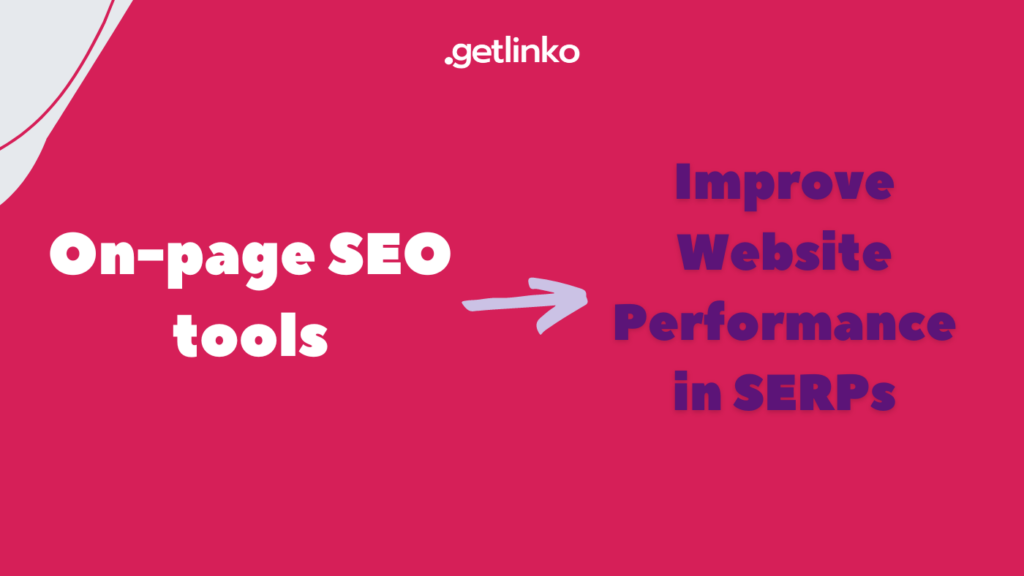
8. Yoast SEO
For websites developed in WordPress, we have Yoast SEO. It is a plugin with a free and premium version implemented to optimize, analyze, and enrich the content of a website. It provides the ability to integrate plugins for local SEO, videos, news, and SEO for Woocommerce. In addition, it is available for other platforms such as Magento, Drupal, and Neos CMS. Among its main features are:
- Keyword and synonym optimization
- High-performing keyword discovery using SEMrush (Premium) technology
- Multi-keyword optimization (Premium, only 1 keyword in the free version)
- Internal Linking Suggestions (Premium)
- Preview the website in search results
- Preview website in social media shares (Premium)
- Verifying the readability of content in posts and pages
- Structured Data Blocks
- Control and configuration of breadcrumbs
- Configuring Sitemaps
- Configuring canonical URLs
- Redirect Manager (Premium)
As we can see, the free version is complete despite its limitations. As a result, Yoast is one of the most downloaded SEO tools for WordPress. On the other hand, the premium version allows full access to all Yoast SEO academy courses, as well as free 24/7 support for a year. So, this plan has a one-time cost of 89 USD for one website.
9. SEOQuake
SEOQuake is a free toolbar compatible with Google Chrome, Firefox, and Opera. With this tool, it is possible to perform an SEO audit and obtain internal website data related to URLs, title tags, and meta descriptions, as well as HTML headings and ALT attributes. In addition, it examines the site’s compatibility with mobile devices and verifies the presence of XML sitemaps, Robots.txt files, and language coding, among other factors.
Outside of being an on-page SEO tool, this extension is very useful for inspecting internal and external links and comparing domains and URLs in real time. It also provides metrics on websites ranked by keywords of interest searched on Google.
SEO Tools: Link Building
The analysis of backlinks and their construction is fundamental to the SEO process. Thus, it is possible to have information about the domain authority and the quality of the links, both for your own website and for competitors. This will allow you to plan your link-building strategies more intelligently. Here are our recommendations for link-building SEO tools:
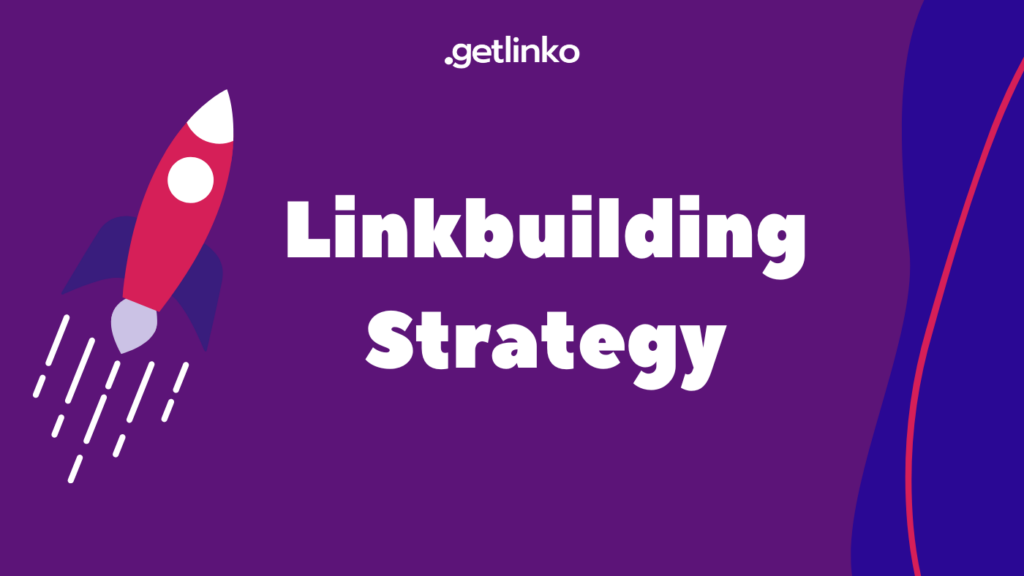
10. Majestic
Majestic SEO is the perfect tool for backlink analysis and link-building strategy optimization. Well, it provides data for a website based on its Citation Flow (number of links) and Trust Flow (quality and reliability of links) metrics. In addition, it works to identify negative and disreputable links and find domains to link to. Among the main features of Majestic, we have:
- Site explorer: It allows you to analyze any domain or URL in detail, providing accurate data on inbound and outbound links.
- Bulk backlink checker: Exclusive to know what the inbound links of a website are. So it analyzes how many domains point to the site and which of them are considered referring or higher authority domains.
- Fresh index: Here you can view the links that Majestic has detected in the last 90 days.
- Search explorer: It provides a keyword index based on its own link crawl data. To do this, examine URLs, domain names, and anchor text.
In terms of price, Majestic manages three monthly payment plans: Lite for 49.99 USD, Pro for 99.99 USD, and Appi Complete for 399.99 USD. You can also try out some of the tool’s features for free with some limitations.
11. Cognitive SEO
Cognitive SEO is a paid tool for analyzing backlinks and auditing links. Its duties include the real-time inspection of a website’s inbound links and the evaluation of competitors’ link-building strategies. It also allows you to identify the causes that can lead a site to be penalized, so it helps prevent penalties for unnatural links.
In addition to being one of the link-building SEO tools, Cognitive SEO also analyzes the technical details of a website and allows audits to happen. Furthermore, it has a content optimization tool based on natural language processing (NLP).
The price to purchase the tool starts at 129.99 USD per month, but when you buy it for a whole year, you get a 30% discount. On the other hand, Cognitive SEO also provides free options to analyze a domain, find keyword suggestions, and learn about changes in Google’s algorithm.
12. Getlinko
We continue our list of recommendations with a specialized platform for buying and publishing links and sponsored posts. This is through a catalog with over 5,000 blogs, newspapers, and other media from all over the world organized by different specialties. This is Getlinko; here, you can design effective link-building strategies and get relevant and quality SEO links for your website at affordable prices.
All you have to do is register as an advertiser, review the most relevant media for your sector (segmented by country, topic, and SEO metrics), and make the request. In short, Getlinko will allow you to increase the online visibility of your project, as well as boost its SEO, thanks to quality backlinks.
Technical SEO Tools
Hand in hand with on-page SEO tools are technical SEO tools. These help us verify that the website is performing well and correct errors. All of this is in order to comply with the quality factors and guidelines required by search engines to show a site in their index.
13. Google Search Console
Google Search Console is one of the most complete and indispensable free SEO tools within an organic positioning process. Linking a website to Google’s Search Console is the first step in determining the health of your website. This is a tool focused on a site’s appearance in search results. Firstly, it works to identify and resolve errors related to its performance, and secondly, it allows you to understand how Google perceives the site. In this sense, its main characteristics are:
- Check a website’s indexing status
- Resolve Crawl Errors
- Request indexing of new or updated content
- View site traffic data in Google search
- Troubleshoot mobile usability and search features
- Submit sitemaps to tell Google what we want it to crawl
- Analyze the robots.txt file
- Finding Structured Data Issues
For better performance and more complete metrics, it is possible to integrate Search Console with Google Analytics.
14. Screaming Frog
Screaming Frog is a downloadable software that works as a crawler to improve a website’s SEO. This is done through the analysis and extraction of data related to each component on the site. Based on this, it conducts an audit that includes the following:
- Analysis of all site titles and meta descriptions
- H1-H6 Headers Review
- Discovery of duplicate and low-quality content
- Broken Link Detection
- Evaluation of internal linking and URL architecture
- Creating a sitemap.xml file based on crawl results
- robots.txt Review
This software features a free Lite version with a crawl limit of 500 URLs and other restricted functionalities. On the other hand, the paid version costs approximately 181 USD per year.
15. Google Pagespeed Insights
Pagespeed Insights is another one of the best free SEO tools provided by Google. Pagespeed Insights allows you to check the performance of a website based on the analysis of factors related to its loading speed. It also focuses on the user experience and offers suggestions to improve the score obtained by correcting the errors found. The score provided by the tool ranges from 1 to 100 and is divided into three ranges: 0–49 (to improve), 50–89 (fair), and 90–100 (good).
Pagespeed Insights analysis uses Lighthouse, an automated open-source tool from Google. Its purpose is to improve the overall quality of web pages. So you can evaluate factors like performance, accessibility, progressive web apps, and more for mobile and desktop.
SEO Tracking Tools
The following tools will help you review your website’s performance in search results. Thus, you will be able to monitor the positioning status of the site with respect to the keywords of interest.
16. SERPWoo
Although it is not as popular, SERPWoo is a very effective tool for monitoring keywords and analyzing rankings in search results. It has full functionalities for keyword research as well as keeping an eye on mentions of a brand online. It is an accurate SEO ranking tracker that provides daily ranking data to understand a website’s performance in the SERPs. Additionally, it has its own on-page SEO analysis tool called Zora to complement ranking tracking.
It also provides users with help guides to understand how to use each of its features. In terms of cost, SERPWoo offers plans from 49.95 USD to 299.95 USD monthly.
17. Whats My SERP
This tool allows you to track a website’s ranking in the SERPs, checking the top 100 results for different keywords. Its free version includes the monitoring of 10 keywords per day. It also has a feature to monitor local SEO and results on mobile devices.
On the other hand, What’s My SERP generates PDF reports and provides data on search volume and cost per click. It also allows integration with Google Analytics and provides 24/7 customer support. Its paid version costs 4.99 USD per month.
Analytics tools
SEO analysis tools make it easy to measure KPIs and metrics related to a website’s traffic. In the same way, they inform us about the behavior of users with data such as the time spent on the site, the most visited URLs, and the access devices, among others. Here are two of the most commonly used SEO analytics tools:
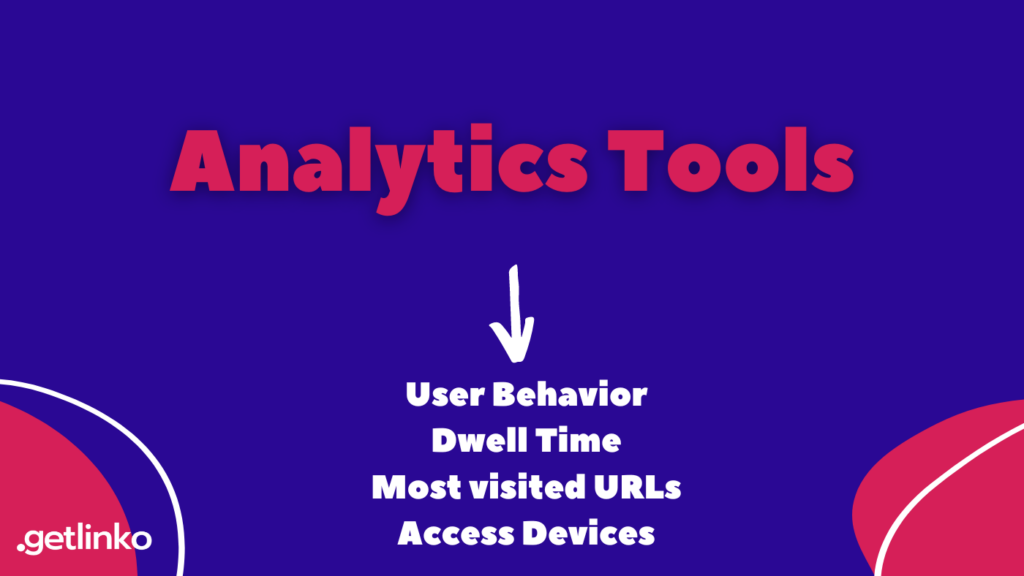
18. Google Analytics
This free service from Google is the most recognized and implemented for obtaining SEO metrics and KPIs. It provides data about traffic sources, demographics, access devices, location, and language. Additionally, it provides information on the number of new and returning users, average session duration, bounce rate, conversion rate, and more. In this sense, Google Analytics tells us how users behave within a website.
Therefore, it is a fundamental tool to understand what is happening on the site and what the opportunities are for improvement. It also allows integration with other tools, such as Google Ads and Google Search Console.
19. Yandex.Metric
Yandex is a free alternative to Google Analytics that is used for the comprehensive analysis of a website. Such is its popularity and effectiveness that it is the third most used web analytics service and works on more than 8 million sites. Its features include tracking traffic, users, sessions, behavior, technologies, and more. The tool works with heat maps that indicate which parts of the site attract the most attention and which are the weak points.
In addition, it has an intuitive dashboard that allows users to quickly view the information and filter it by time intervals. It also has an extension for Google Chrome and a plugin for CMS such as WordPress, Drupal, Joomla!, Magento, and Shopify, among others.
Local SEO Tools
Local SEO is the optimization actions in order to improve the positioning in the local search results, that is, for specific locations. Here, the location of the users becomes a key factor in filtering and classifying the results. So, let’s look at the tools:
20. Google My Business
When it comes to free tools for local SEO, we can’t leave out Google My Business, which belongs to the Google suite. It is a platform that allows a business to gain greater visibility in the SERPs and Google Maps. Therefore, its implementation is of great relevance for businesses with physical points of service like restaurants, stores, etc. There, it is possible to create a company profile that has the following advantages:
- Add contact information (phone, address, website, hours of operation, company description)
- Showcase products and services (Include photographs of the business)
- Receive ratings from users
- Get Stats
Thus, having a profile on Google My Business increases the chances of positioning yourself in a specific location. Clearly, all of this focused on keyword research and supported the other SEO actions.
Final Words
There is no doubt that the use of SEO tools to support the organic positioning process is crucial for its success and effectiveness. Not only because they allow you to measure and extract key data about a website but also because they are the vehicle to analyze the information and propose improvement actions based on the results. Now that you know what SEO tools are, examine them and decide which ones to use within your strategy.
But before you go, tell us which ones you are already using. Are there any that you didn’t know about? Let us know in the comments.



